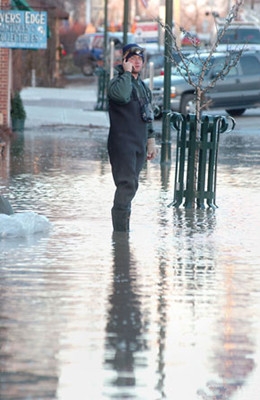(单词翻译:单击)
中英文本
Science and technology
科学技术
Meteorology
气象学
Counting raindrops
雨量计算
How to use mobile-phone networks for weather forecasting
怎样利用移动手机网络预报天气
FORECASTING the weather requires huge quantities of data.
天气预报需要大量的数据信息。
Many of these data are collected by high-tech means such as satellites and radar, and then crunched by some of the world's fastest supercomputers into predictions that are far more accurate than they were 20 years ago.
大部分数据是通过高科技产品,比如卫星和雷达收集起来,然后,由世界上运算最快的超级计算机来处理这些数据后进行预测,现在的预报已经比二十年前准确多了。
But low-tech tools are important too—especially old-fashioned rain gauges, which are nothing more than tubes with funnels fixed to places such as rooftops.
但是,技术层次较低的工具也同样重要—特别是老式的雨量计,其实只是把带有漏斗的量管固定在类似屋顶的位置。
Each technique has its upsides and downsides.
每种技术都有优缺点。

Radar and satellites can cover swathes of land, yet they lack detail.
雷达和卫星可以覆盖很多地带,但是缺乏细节性。
Gauges are much more accurate, but the price of that accuracy is spotty coverage.
相比较而言,雨量计更加准确,但是这种覆盖面准确度的价值却参差不齐。
Now, though, Aart Overeem of the Royal Netherlands Meteorological Institute and his colleagues reckon they have come up with another way to keep an eye on the rain.
但是,现在荷兰皇家气象研究所的阿尔特-欧维姆和他的同事们认为,他们已经提出了另一种可以监测雨量的方式。
It offers, they believe, both broad coverage and fine detail.
他们认为,这种方式既能够实现大范围的覆盖,又可以提供具体的细节。
Best of all, it relies on something that is already almost omnipresent—the mobile-phone network.
最重要的是,这种方式所依赖的现在已经无所不在—那就是移动手机网络。
Their scheme starts from the observation that rain can make it harder for certain sorts of electromagnetic radiation to travel through the atmosphere.
他们提出的新方式起始于一种观测—当某些特定的电磁辐射穿越大气层时,下雨会增加穿透的难度。
Measure this impedance and you can measure how rainy it is.
衡量这种阻力,你就可以测试出雨量的多少。
The researchers do not measure the strength of mobile-phone signals themselves.
研究者并没有测量移动手机信号本身的强度。
Instead, they piggyback on something that mobile networks already do, and measure the strength of the microwave links that base stations use to talk to each other.
相反,他们增加了移动网络已有的某些物质,然后测量用于双方通话基站的微波链接强度。
The idea itself is not new, and there have been trials in recent years.
这种方式本身并没什么新意,最近几年一直都在进行类似的试验。
But, as they report in the Proceedings of the National Academy of Sciences, Dr Overeem and his colleagues have successfully applied the technique to an entire country.
但是,就像他们向美国国家院报告中提到的,欧维姆博士和他的同事已经在一个国家成功地实现了它的全国性应用。
Using data from around 2,400 links between base-stations belonging to T-Mobile, one of the Netherlands' three mobile-phone operators, they were able to generate a rain map of the whole kingdom every 15 minutes.
通过分析荷兰三大移动运营商之一:T-Mobile所属的2,400个基站产生的数据,他们能够每十五分钟就制作出一个全国的雨量分布图。
Like all the best science, the idea is both technically elegant and practically useful.
就像所有最好的科学一样,这种方式在技术上很简练,而且很有实用性。
Dr Overeem points out that simply coming up with another way to measure rainfall is handy by itself, since it allows better cross-checking of existing methods.
欧维姆博士指出,简单地用另一种方法测量雨量本身就很方便,因为这种方法可以对现有的方式进行再次核查。
There are other advantages, too.
这种方法也有其它方面的优势。
Coverage is one.
覆盖面就是其一。
Even in rich countries with well-financed weather forecasters, there are likely to be far more mobile-phone base stations than rain gauges.
甚至在天气预报配备方面资金充足的发达国家,移动手机基站的数量也可能远远超过雨量计的数量。
That is truer still in poor countries, where rain gauges are scarce and radar often nonexistent, but mobile phones common.
而这种现象在贫困国家则更加明显,在那里雨量计很稀少,往往根本没有。
The GSM Association, a mobile-phone trade group, estimates that 90% of the world's population lives within range of a base station.
但是拥有移动手机却很普遍。全球移动通信系统协会—一家移动手机贸易组织—估计,全世界有90%的人口居住在基站所覆盖的范围内。
Another boon is that network operators tend to keep a close eye on their microwave links.
另一个福音就是网络运营商们往往都会密切关注他们的微波链接。
Although the researchers were able to obtain data only every 15 minutes, some firms sample their networks once a minute.
尽管研究者只需要十五分钟就能收集到数据,但是有些运营商能在一分钟内对他们的网络进行抽查。
That means rainfall could, in principle, be measured almost in real time, something that neither gauges nor radar nor satellites can manage.
从原理上来讲,那就是说雨量可以进行实时测量,而这点是雨量计,雷达或者卫星都无法做到的。
The technology is not perfect: snow and hail are harder than rain for microwaves to spot, for example.
这种技术也不是完美无缺的:比如,相比较下雨,要想在下雪和冰雹时探测到微波的可能性更小。
And there are other caveats.
而且还有些其它注意事项。
Mobile networks are densest in urban areas, which are also the places most likely to have meteorological equipment already.
城镇地区是移动网络最密集的,而那里也是最有可能已经配备了气象设备的地区。
Even in the rich, urbanised Netherlands, coverage outside cities was noticeably patchier.
甚至在富有的,城镇化的荷兰,城市外移动网络的覆盖也是零星点点。
But that might eventually prove to be a boon, for if the technology becomes widespread then weather forecasters might contribute to the cost of installing base stations in coverage blackspots.
但是,这可能最终也会转为有利条件,因为,如果这种技术能够被广泛应用的话,那时天气预报可能会对在无覆盖地区安装基站有所帮助。
something for which the 10% of humanity not yet within range of a mobile-phone mast might be thankful.
而那些至今还未生活在移动电话覆盖区域中的10%的人可能会对此心存感激的。
词语解释
1.such as 像,例如;譬如
Big u.s. firms such as kfc owner yum!
美国的大公司如kfc的拥有者yum!
What about future steps such as euro bonds?
诸如欧元联盟之类的未来计划怎样?
2.rain gauge n.雨量测量器;雨量计
He hoped that the rain gauge could be put into practical use.
他希望做出来的雨量计实际可用。
This vermont estate rain gauge will show the answer clearly with extra large magnified numerals.
这佛蒙特州村雨量计会显示答案显然超大放大数字。
3.come up with 追赶上;比得上;想出
To come up with more creative and innovative designs?
还是想出更原创性和革新性的设计?
Others strive to come up with something a little different.
其他人力图想出些有点不同的名字。
4.rely on 信赖;依赖;依靠
We rely on corporations like bp to bring us energy.
我们依靠像bp这样的公司来供给我们能源。
The firm cannot rely on reputation forever.
公司不可能永远依赖其名声。


